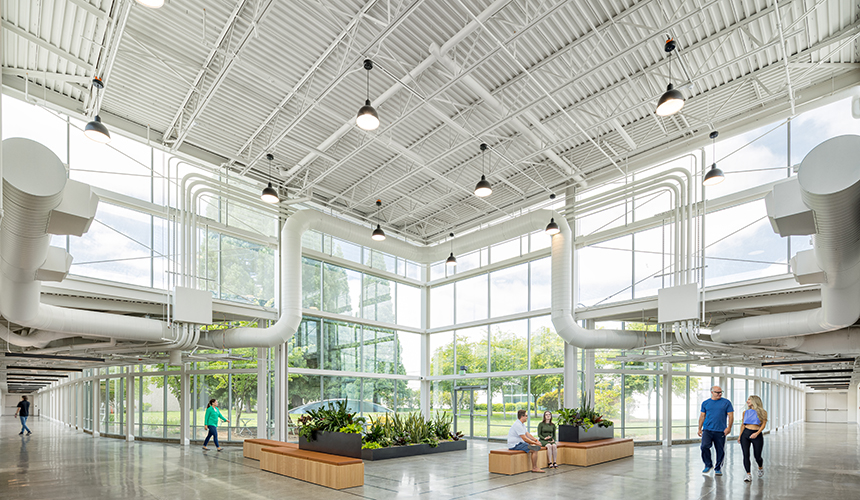
The Vancouver Innovation Center (VIC) is a mixed-use development in SW Washington that serves as a central spot to live, work, shop and play. Previously functioning as a large business park, investors New BluePrint Partners LLC and Rabina worked together with Energy Trust of Oregon to evaluate the various buildings in the development and identify energy-saving upgrades that would improve existing equipment and appeal to new retail tenants.
With over 179 acres and 715,000 square feet of existing industrial/commercial building space, the developers were tasked with turning an old business park into a new neighborhood hub. One of the first steps when taking ownership of a business development is to evaluate and understand current energy use to reduce operating expenses and attract new tenants.
“Every time we look at a project, we always think about upgrading infrastructure. Part of our building due diligence is understanding operating expenses. Why are you running your boilers in the middle of the summer? Well, we’re running boilers because we don’t have good controls,” said Marc Esrig, principal at New BluePrint Partners LLC.
It’s no easy feat to overhaul and upgrade a development of this size. Starting in summer 2020, the development underwent a Technical Analysis Study (TAS), which outlined a list of specific adjustments that could be made to building control systems and included low- and no-cost recommendations to help reduce energy use. The TAS uncovered heating and cooling inefficiencies across the development that were wasting energy.
Since this discovery, Trane, an Energy Trust Allied Technical Assistance Contractor (ATAC), has been working with VIC developers and managing partners to complete a multi-phase approach to upgrade the HVAC building controls systems across seven buildings.
In phase one, the property management team took a strategic look at replacing the chillers, upgrading the building management system and replacing the interior and exterior lighting in building #2. “The building management system was sort of cobbled together and wasn’t working correctly,” said Esrig. Previously, the chiller would turn on and run at a certain set point. The building control projects allow building operators to look at the data and make decisions on the most efficient way to maintain comfort in the space. The new Trane system can monitor and adjust the building’s various systems from one central point saving time for the management team.
Other adjustments made as part of the building control projects included tuning optimal start routines, ventilation control, air handling unit (AHU) duct static pressure control, AHU supply air reset control and AHU set-back control options. Significant energy savings are achieved through these system modifications and the energy savings are immediate. “We’ve done some measurement and verification out there and have verified that we are getting the energy savings that we expected,” said Esrig.
Phases two and three, in buildings #3 and #4, included upgrading HVAC system controls to Direct Digital Controls (DDC), which provide more flexibility and optimization to help reduce overall energy use.
These three phases of energy upgrades are part of a larger property improvement project that the VIC partners have invested over $12 million in. The VIC received nearly $300,000 in cash incentives from NW Natural and Energy Trust and is saving over $150,000 in annual energy costs. When the fourth phase is completed, the VIC will receive even more Energy Trust cash incentives for their additional energy-efficiency improvements.
The cash incentives and studies offered by Energy Trust were an integral part to the long-term financial success of the VIC. “We may not see the benefit of these investments today in terms of complete return, but over the next 10-15 years we’ll realize savings in those returns,” said Esrig.
Learn more about how your business can reduce energy costs and improve your bottom line. For more information, visit www.energytrust.org/existingbuildings or email existingbuildings@energytrust.org.

